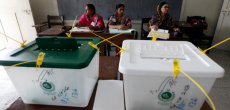[vc_row][vc_column][vc_column_text dp_text_size=”size-4″]
Security measures have been intensified nationwide, particularly in major cities, following a threat alert issued by intelligence agencies regarding potential militant activities. The alert disclosed that 17 suicide bombers have entered Pakistan, indicating threats from four militant organizations in key cities like Islamabad, Rawalpindi, Quetta, Peshawar, and others.
This heightened alert coincides with Pakistan’s preparations for the postponed general elections scheduled for February 8, 2024.
According to reports, more than 17 terrorists affiliated with four distinct militant groups, including the Tehreek-i-Taliban Pakistan (TTP), have been assigned tasks to carry out terrorist activities across various Pakistani cities.
Read more: Bomb Threat At Pakistans Supreme Court Circulates On Social Media
The Rawalpindi Regional Police Officer (RPO), Syed Khurram Ali, has communicated with the heads of district police through a letter, revealing that the TTP had devised plans for terrorist activities in Rawalpindi, Islamabad, the newly merged tribal districts in Khyber Pakhtunkhwa (KP), Dera Ismail Khan, and Quetta.
The letter suggests that the TTP has received funding from the Tehrik-i-Taliban Afghanistan to support its militant activities.
In another communication, it was disclosed that a Baloch Sub Nationalist militant group had intentions to target police, officials from law enforcement agencies, and the general public.
A senior police official informed the media that security measures have been heightened at sensitive institutions and at the entry and exit points of major cities.
The situation underscores the importance of a robust security response, especially in the lead-up to crucial events such as the general elections. The presence of suicide bombers and threats from multiple militant outfits necessitate a comprehensive and proactive approach to safeguarding public safety.
The intelligence reports highlight the specific cities and regions where heightened vigilance is required. Rawalpindi, Islamabad, the tribal districts in KP, Dera Ismail Khan, and Quetta are identified as potential targets, prompting security forces to focus on fortifying defenses in these areas.
The revelation of external funding from Tehrik-i-Taliban Afghanistan raises concerns about cross-border support for militant activities, emphasizing the need for collaboration with international counterparts to address the broader regional security landscape.
Overall, the security apparatus’s responsiveness to these threat alerts is critical in mitigating potential risks and ensuring the safety of citizens during a period of increased vulnerability, such as the electoral process. It is anticipated that security forces will continue to coordinate efforts and implement measures to neutralize the identified threats and maintain a secure environment for the upcoming elections and beyond.
[/vc_column_text][/vc_column][/vc_row]











